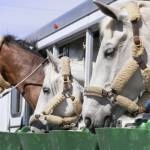Shipping Horses: Effects on Stomach Health

Many humans become woozy with travel, whether by plane, train, or automobile. For horses, motion sickness may manifest not as light-headedness or nausea but as gastric upset. In fact, transportation has been suggested as a risk factor for gastric ulcers in horses. Is there truth in this assertion? European researchers recently set out to answer that question.*
A dozen mares were confined and fitted with indwelling nasogastric tubes for 12 hours overnight. Researchers aspirated gastric fluid and tested its pH, and also assessed gastric ulceration through endoscopy. Twenty-six mares, including the 12 in the first phase of the study, were transported for 12 hours overnight. During transport, gastric fluid from the original 12 mares was aspirated through indwelling nasogastric tube. Gastric ulceration was evaluated endoscopically from all mares before and after the trip.
The pH of gastric fluid in confined mares was 1.70-2.49, while the gastric pH of the same mares during transport increased, becoming less acidic at 6.8-7.2. Despite a rise in pH, “transport was associated with increased gastric squamous ulcer scores, particularly in horses fasted for gastroscopy and nasogastric tube placement before departure,” according to the researchers.
“While this study didn’t mention whether the mares were tried-and-true or inexperienced travelers, it did confirm that transport caused changes to the sensitive lining of the stomach,” explained Catherine Whitehouse, M.S., a nutrition advisor for Kentucky Equine Research.
Once established, gastric ulcers can be difficult to heal, usually requiring treatment with omeprazole. Because of this, it is best to avoid ulcers altogether through careful planning and appropriate supplementation prior to transport.
“Horse owners can help minimize stomach damage through the use of research-proven digestive aids,” Whitehouse recommended. “In addition to an antiulcer supplement, give the horse access to hay and stop every few hours to allow the horse to drink during long hauls.”
*Padalino, B., G.L. Davis, and S.L. Raidal. 2020. Effects of transportation on gastric pH and gastric ulceration in mares. Journal of Veterinary Internal Medicine 34(2)922-932.








